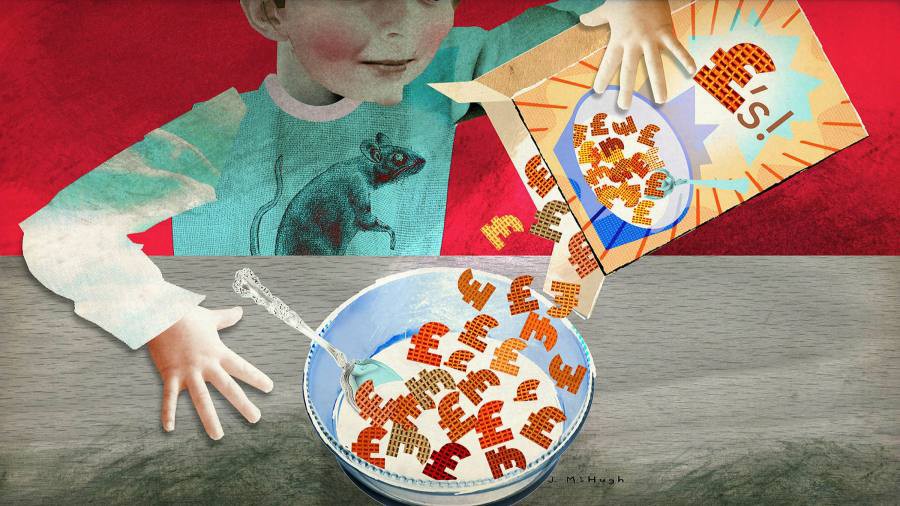The NHS spends more than £6bn per year treating obesity-related health problems, and the cost is set to rise to almost £10bn by 2050.
Financial Times
Camilla Cavendish
April 29, 2022
When our children were small, Coco Pops were the bane of my life.
Any weekend break at a hotel or friends’ house would feature these crunchy globules of emptiness that were banned at home. Our kids would spend the morning on a sugar high, and be in tears by lunch.
So I couldn’t suppress a wry laugh at the announcement by Kellogg, the cereal group, that it is suing the UK government for its failure to consider the benefits of milk in new restrictions on fatty sugary foods.
The issue isn’t the milk, guys — it’s your products, which make up a third of all cereals eaten in Britain.
This legal challenge is the clearest indication yet that Big Food is on the run.
Kellogg knows that the new rules will demote profitable parts of its range from supermarket promotions and prime shelf space, where our eyes lock on to junk and can’t look away.
For many years, the food and drink industry has argued that it’s fine to stuff ourselves with treats, as long as they’re part of a “balanced diet”.
The problem is that we humans aren’t good at resisting temptation.
Surveys show that people want to eat more healthily. But this clashes with the reality of what we actually consume.
The Covid pandemic has made us more aware of the dangers of obesity. But Americans and Brits are actually more overweight than before, as stress and sedentary lives take their toll.
For many years, the food and drink industry has argued that it’s fine to stuff ourselves with treats, as long as they’re part of a “balanced diet”.
The Covid pandemic has made us more aware of the dangers of obesity. But Americans and Brits are actually more overweight than before, as stress and sedentary lives take their toll.
I am no saint myself. For years as a journalist I was incapable of meeting a deadline without a Coke and a Yorkie bar, after sitting next to a colleague who mainlined them.
… fat and sugar light up our brains in the same way as nicotine.
One researcher swore he could never look at cheesecake again, after having fed it to rats in a lab. So irresistible was the dopamine hit that the rats ended up diving right into the cheesecake to gorge themselves.
Eventually some preferred to starve rather than eat anything else, an effect he compared to heroin.
You can argue that we are not lab rats: we are not force-fed and we can read articles about the importance of “five a day”.
But po-faced leaflets can’t compete with the marketing geniuses who have managed to convince us that ultra-processed stuff of virtually no nutritional value is actually food. And who have persuaded hard-pressed families to spend money on it.
How have we got to the point where staples such as bread and cereal are a minefield?
The biochemist Terence Kealey once called breakfast in the English-speaking world a “ weapon of mass insulinisation “, referring to the way that sugar-heavy breakfasts raise blood glucose levels.
And some American children go whole days without drinking water, according to researchers at Penn State University, drinking fizzy drinks instead, even though water is free.
When Michael Bloomberg tried to ban giant-sized soda drinks from New York, he was defeated in the courts by the industry, which argued that a ban was an unconstitutional infringement on liberty.
When I was part of the UK government which imposed the soft drinks industry levy in 2016, the most vociferous attacks came from Coca-Cola, which threatened to take us to court, though it eventually backed down.
When Michael Bloomberg tried to ban giant-sized soda drinks from New York, he was defeated in the courts by the industry, which argued that a ban was an unconstitutional infringement on liberty.
Governments that have been wary of telling people what to buy are finally realising that poor nutrition poses a direct threat to their health budgets.
The NHS spends more than £6bn per year treating obesity-related health problems, and the cost is set to rise to almost £10bn by 2050.
The obesity strategy of Boris Johnson’s government is the product of the prime minister’s own epiphany after his near-death experience from Covid — and the realisation that “levelling up” will be an empty slogan unless we tackle gaping health inequalities between rich and poor.
The NHS spends more than £6bn per year treating obesity-related health problems, and the cost is set to rise to almost £10bn by 2050.
Pressure is also coming from investors, who may start to see junk food companies as potentially risky stranded assets.
Until recently, the field has been left to a few activist investors such as Dan Loeb, who mischievously spoofed Campbell’s soup with his own refrain of “Mmm, mmm, bad”.
But now, mainstream investors are waking up.
BMO and Legal & General are among investors who have written to the boards of Kellogg, Danone, Nestlé and Kraft Heinz asking for greater disclosure of information about nutrition and health.
All of these companies will have to become more transparent.
The coming months will see “healthier” ranges launched by brands such as Kettle chips and Walkers crisps — just as we saw drinks reformulate after the soft drinks levy.
It is true that companies like Kellogg have only delivered what consumers wanted: tastes we love. But some privately welcome legislation to wean us all — buyers and sellers — off the junk food cycle.
The coming months will see “healthier” ranges launched by brands such as Kettle chips and Walkers crisps — just as we saw drinks reformulate after the soft drinks levy.
There will inevitably be wrangling — including legitimate questions about how to judge nutritional value, and whether the playing field is truly level.
According to The Grocer, Kellogg has questioned why cereals are in the scope of the government regulations while chocolate spreads are exempt.
The company says it has removed 11,000 tonnes of sugar since 2011, 60 per cent of salt since the 1990s and that none of its children’s cereals will be high in fat, salt or sugar by 2023.
But the truth is that big, lasting changes will only come about through regulation.
For our own preservation, I hope that the courts will give Kellogg a Frostie reception.
We have been the lab rats for too long.
We have been the lab rats for too long.
Originally published at https://www.ft.com on April 29, 2022.












